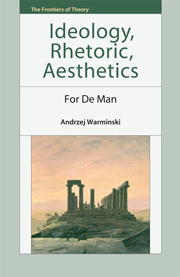Book contents
- Frontmatter
- Contents
- Series Editor's Preface
- Author's Preface
- Acknowledgements
- List of Abbreviations
- PART I Aesthetic Ideology
- 1 Allegories of Reference: An Introduction to Aesthetic Ideology
- 2 “As the Poets Do It”: On the Material Sublime
- 3 Returns of the Sublime: Positing and Performative in Kant, Fichte, and Schiller
- 4 Lightstruck: “Hegel on the Sublime”
- PART II Hegel/Marx
- PART III Heidegger/Derrida
- Appendix 1 A Question of an Other Order: Deflections of the Straight Man
- Appendix 2 Response to Frances Ferguson
- Index
3 - Returns of the Sublime: Positing and Performative in Kant, Fichte, and Schiller
from PART I - Aesthetic Ideology
Published online by Cambridge University Press: 05 October 2013
- Frontmatter
- Contents
- Series Editor's Preface
- Author's Preface
- Acknowledgements
- List of Abbreviations
- PART I Aesthetic Ideology
- 1 Allegories of Reference: An Introduction to Aesthetic Ideology
- 2 “As the Poets Do It”: On the Material Sublime
- 3 Returns of the Sublime: Positing and Performative in Kant, Fichte, and Schiller
- 4 Lightstruck: “Hegel on the Sublime”
- PART II Hegel/Marx
- PART III Heidegger/Derrida
- Appendix 1 A Question of an Other Order: Deflections of the Straight Man
- Appendix 2 Response to Frances Ferguson
- Index
Summary
There is more than a little irony in an afterthought Fichte appends to his account and examples of what he calls thetic judgments. After having explained why “I am” constitutes “the first and foremost judgment of this type” and how all judgments subsumed under it, “i.e., under the absolute positing of the self,” are also of this type – “for example, man is free” – Fichte adds, after a dash: “The judgment of taste, A is beautiful (so far as A contains a feature [Merkmal] also present in the ideal of beauty), is likewise a thetic judgment; for I cannot compare this feature (Merkmal) with the ideal, since the latter is unknown to me. It is, rather, a mental task (eine Aufgabe meines Geistes) derived from the absolute positing of myself, to discover this ideal, though one that could only be discharged after a completed approximation to the infinite (nur nach einer vollendeten Annäherung zum Unendlichen). – Thus Kant and his followers have very properly described these judgments as infinite, though nobody, so far as I know, has explained them in a clear and determinate manner” (WL 37-8, 115). It is appropriate – and convenient for me – that Fichte here names both Kant and his followers, for the irony of his complaint – that no one has been able to explain aesthetic reflexive judgments in a satisfactory manner – points both backwards and forwards: back to the Kantian problematic and its inconclusive solution in the Third Critique; and forward to the solution – or non-solution – of the German idealists, starting with Schiller and his peculiar appropriation of Kant (and of Fichte) in the Letters on the Aesthetic Education of Man.
- Type
- Chapter
- Information
- Ideology, Rhetoric, AestheticsFor De Man, pp. 65 - 78Publisher: Edinburgh University PressPrint publication year: 2013



